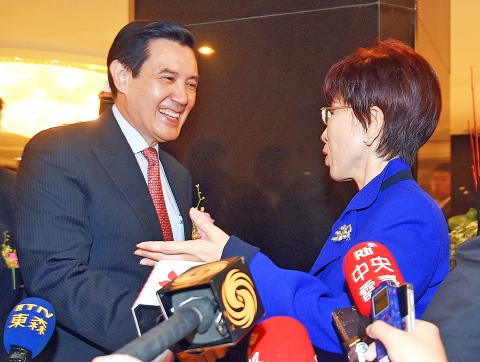Chinese Nationalist Party (KMT) presidential candidate Hung Hsiu-chu (洪秀柱) yesterday reiterated that her cross-strait policy is no different from that of President Ma Ying-jeou (馬英九), a day after KMT Chairman Eric Chu (朱立倫) said her policy deviated from the mainstream and that the party has decided to call an extempore congress to consider a new candidate.
Speaking at the World Peace Congress held by the Chinese World and Nation Peace Association, Hung said she is “still the presidential candidate nominated by the KMT.”
Addressing the crowd, Hung said she was “alone on the stage” as the president had just left.

Photo: Liao Chen-huei, Taipei Times
She recounted her candidacy from the first day she registered for the KMT primary.
“I have felt this solitude since the day I registered for the primary, but I have not been alone or lonely, since I have many friends supporting me. Today, there are people who said it felt awkward as they do not know how to address me. It is not. I am the deputy legislative speaker of the Republic of China, and currently still the KMT presidential candidate,” Hung said.
She said that Ma “once publicly stated on television that my cross-strait policy is no different from his.”
“My ‘one China’ is the Republic of China,” she said, adding that Ma’s cross-strait policy has gained people’s trust and reflects mainstream public opinion.
While there is very little difference between her cross-strait policy and Ma’s, hers is “clearer on certain aspects,” Hung said.
She highlighted the need for a peace agreement, saying that to secure the achievements Ma has made in cross-strait relations over the past seven years, there needs to be “a breakthrough and a deepening of the [so-called] ‘1992 consensus.’”
Ma, who left yesterday’s event early, had a chance to shake hands with Hung before leaving. He did not respond to media queries about Hung’s cross-strait policy and whether he would talk her out of the race. He said he would stand by the decision made by KMT headquarters.
Separately, World Taiwanese Chambers of Commerce president Jonathan Huang (黃正勝), who is also the head of a Hung supporters’ club within the association, said Hung’s comment on the “eventual unification” with China worries many Taiwanese businesspeople.
“Cross-strait relations should have been the KMT’s forte. Why has it become a problem [for the party], which has aroused the concern of many overseas Taiwanese businesspeople? Why talk about ultimate unification? There is no need to stir up a hornet’s nest,” Huang said.

Taiwan is stepping up plans to create self-sufficient supply chains for combat drones and increase foreign orders from the US to counter China’s numerical superiority, a defense official said on Saturday. Commenting on condition of anonymity, the official said the nation’s armed forces are in agreement with US Admiral Samuel Paparo’s assessment that Taiwan’s military must be prepared to turn the nation’s waters into a “hellscape” for the Chinese People’s Liberation Army (PLA). Paparo, the commander of the US Indo-Pacific Command, reiterated the concept during a Congressional hearing in Washington on Wednesday. He first coined the term in a security conference last

Prosecutors today declined to say who was questioned regarding alleged forgery on petitions to recall Democratic Progressive Party (DPP) legislators, after Chinese-language media earlier reported that members of the Chinese Nationalist Party (KMT) Youth League were brought in for questioning. The Ministry of Justice Investigation Bureau confirmed that two people had been questioned, but did not disclose any further information about the ongoing investigation. KMT Youth League members Lee Hsiao-liang (李孝亮) and Liu Szu-yin (劉思吟) — who are leading the effort to recall DPP caucus chief executive Rosalia Wu (吳思瑤) and Legislator Wu Pei-yi (吳沛憶) — both posted on Facebook saying: “I

Sung Chien-liang (宋建樑), who led efforts to recall Democratic Progressive Party (DPP) Legislator Lee Kun-cheng (李坤城), was released on bail of NT$80,000 today amid outcry over his decision to wear a Nazi armband to questioning the night before. Sung arrived at the New Taipei District Prosecutors’ Office for questioning in a recall petition forgery case last night wearing a red armband bearing a swastika, carrying a copy of Adolf Hitler’s Mein Kampf and giving a Nazi salute. Sung left the building at 1:15am without the armband and covering the book with his coat. Lee said today that this is a serious

The Ministry of Economic Affairs has fined Taobao NT$1.2 million (US$36,912) for advertisements that exceed its approved business scope, requiring the Chinese e-commerce platform to make corrections in the first half of this year or its license may be revoked. Lawmakers have called for stricter enforcement of Chinese e-commerce platforms and measures to prevent China from laundering its goods through Taiwan in response to US President Donald Trump’s heavy tariffs on China. The Legislative Yuan’s Finance Committee met today to discuss policies to prevent China from dumping goods in Taiwan, inviting government agencies to report. Democratic Progressive Party Legislator Kuo Kuo-wen (郭國文) said